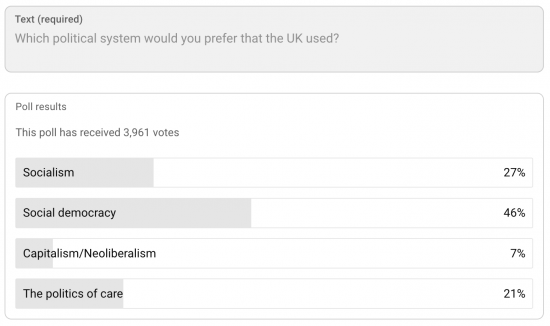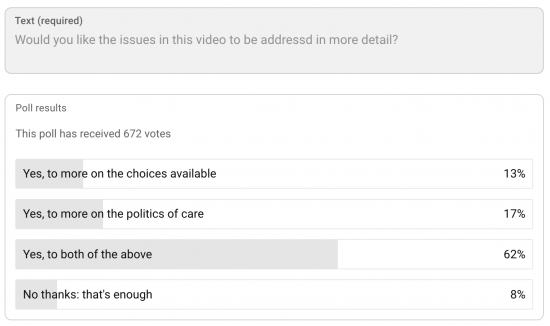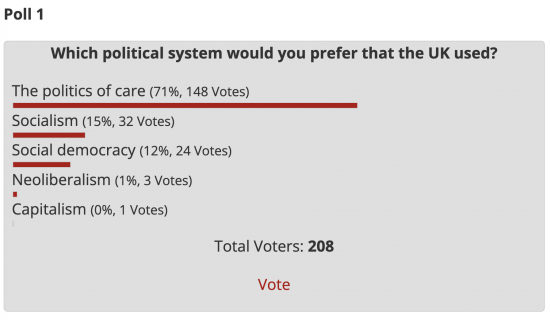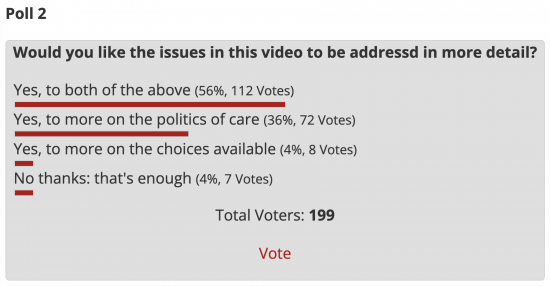I did not expect yesterday's video to get the level of reaction it did.
By last night (when I began preparing this post), the polls related to the video had this many votes and reactions:


By then, the video had been viewed around 11,000 times, which made the first poll, in particular, a very high response rate, and social democracy won, but there was also an appetite for more discussion.
On this blog, the reactions were:


The weighting of the polls was very different, as was the ratio of those voting, which was very small. The blog had 30,000 views yesterday.
I was intrigued by the differences in perspective on social democracy, most of all.
The polls are still open.
What is clear is that this issue needs more work. To add perspective to that, the book I proposed writing when asked by a major publisher to submit a proposal earlier this year was on the Politics of Care, so quite an extensive plan exists. I think you may be hearing more. It could even be that the book might now be written as a series of blogs, or videos, or both.
But I might need another day off to think about that.
Thanks for reading this post.
You can share this post on social media of your choice by clicking these icons:
There are links to this blog's glossary in the above post that explain technical terms used in it. Follow them for more explanations.
You can subscribe to this blog's daily email here.
And if you would like to support this blog you can, here:


 Buy me a coffee!
Buy me a coffee!

I think this post is related to another above about word counts.
What struck me about the post about the politics of care was that it generated a lot of navel gazing about socialism. To me, it was a typical Left leaning reaction I saw as in ‘Let’s not talk about rejuvenating socialism or its best bits or face the onslaught from Neo-liberalism. Let’s just argue amongst ourselves whilst the world grinds inexorably on without us’. It is no better than Starmer’s Labour declaring war on the Left rather than declaring war on Thatcherism whilst people cry out for change. Some of the input was very inward looking and defensive.
Neo–liberalism/Thatcherism – whatever – is difficult to deal with mainly because it talks the language of freedom whilst only delivering freedom to a small bunch of people. For many it will only be a dream. Permanent aspiration of the impossible is the British dream bequeathed by Maggie.
The politics of care is crucial in my view because it potentially overcomes or combats the hyper-individualisation that Thatcherism is about and the ‘anti-social’ drive at the core of it. It is also refreshing in that unlike Giddens that sought to supress the political in policy making, it seeks to make its goal (caring) overtly and proudly political. And I do not see the politics of caring as anti-socialist either; and caring makes sound sense, because it is about investing to save and not create opportunities for profit (or budgetary problems) later on.
I hear people telling me that Farage listens. But all he is doing is recognising people’s problems; he does not offer anything else other than pushing desperate people back into the sea. The politics of caring will not only listen but potentially also guide people out of what ails them by not pretending that the means to do it do not exist. I encourage anyone who is progressive or socialist to drop your guard and embrace the idea. And remember this: we have thousands of years of human history to fall back on. We’ve always relied on each other from the day we were emerged – a powerful force that can be used for good or bad.
And social democracy? We know what the problems are now and how to deliver the answers. All we need is the opportunity.
‘Hope this is not too long.
394 words.
Suggesting a limit of 400 allows an argument to be developed. Thank you.
You’re too kind………….
That’s an excellent comment, Pilgrim. Much to reflect on.
I have suggested writing a social charter mentioning a number of things like a living wage, welfare and disability benefits, price controls of necessities, nationalisation of gas, electricity and water, subsidised public transport and the complete end of the punitive nature of the DWP and other government agencies. There will be political and social elements too but economics is important because we all need money and a fair amount to live on whether we live in palaces or council houses.
I also suggest that we focus on those things we are for and those things we are against. What to me underpins the worst of Thatcherism is the elitism and exclusive nature of it all. Selfishness and pathological individualism does not work. It isn’t working. You only have to look at the state of the UK. We are a failing or indeed failed state.
The term ‘commonwealth’ is something I think of too. It meant something different once. The UK and particularly England is far too unhealthily focussed on those at the top, royals, the wealthy, the great and good. I suggest we up end that by focussing on the needs, rights and well being of the ordinary people, the ones who keep society running and fed, cared for, taught and who do the necessary jobs. If you want a politics of care you start by caring for those who have been forgotten, marginalised, ignored and those who can’t pay their bills and pay for necessities in a society literally awash with wealth. That’s where I begin anyway.
I have noted your charter
Social Charter is this the same as building a new social contract?
If so I certainly think we need one.
Care for me isn’t unconditional. Care be tough too. Those who have had children will know what I mean.
I also think Care comes not with platitudes about being nice, truthful etc but with responsibilities and obligations that should be clear and easy to understand.
To gain something within society should be through giving something too however small. Sometimes people can’t give but in the main such a “we must all help each other” approach should work.
Much to agree with
Eric, I absolutely agree. A social charter and social contract are very similar. You cannot force people who do not care to care, but there are millions of us who do care about others, care about our neighbours, our families and friends and the neighbourhoods we live in, and this obviously encompasses all kinds of people from all walks of life. Cameron’s ‘Big Society’ did not catch on because we knew and they knew it was code word for them getting all the money and good jobs whilst millions dedicated themselves to voluntary jobs with nary a sniff of anything else. Now, that isn’t a dismissal in any way of voluntary work, not a bit, but side by side that there should be a social contract that allocates money to those who need it, a better minimum wage and rights for workers at the lower end and fairer welfare and benefits for those unable to work, and less punitive sanctions like the bedroom tax and taking UC off people whose partners get work. I want the poorer end of society to be treated better, in short.
You must have so many ideas floating around in your head.
Out of interest, do you have a notebook by the side of your bed in case you need to write something down during the night?
Craig
Yes, and yes.
Perhaps the YouTube viewers voted for the choices without first making an attempt to understand what Richard meant by the categories (they confused the map for the territory).
I don’t think it’s unreasonable to suggest that people who read Richard’s output might give it more thought than those who watch a video. Text requires a more proactive approach on behalf of the reader; watching a video is a more passive experience, after all.
Interesting that social democracy looks like it’s something people don’t feel they know much about. That might include me – I tend to think of the rest of Europe, more than UK.
Given the difficulties we’ve seen with definitions, would it be good to have socialism and social democracy defined in glossary (maybe they are) so people can be referred there – this is what is understood by those terms on this blog?
Good to know what a <400 word reply looks like! Neat work, PSR.
Thanks for your comments
Forgive me for intruding into this debate with something “off-topic” – though not entirely so, as it does relate to the Funding the Future blog and its influence.
An email I received today from an NHS defence campaign links to an article on their website about NHS funding which directly refers to the blog and to Stephanie Kelton’s work. The title is “Private finance to power NHS move into community – other options?”
https://lowdownnhs.info/private-providers/private-finance-to-power-nhs-move-into-community-other-options/
Perhaps this is an opportunity to further spread the word?
Thanks
Did the video viewers all watch until the end? Your proposal for a politics of care came last – I wonder if viewer inattention or not actually watching it all could account for the lower vote for Politics of Care? The latter has commonalities with social democracy but with less emphasis on the material side of life and more on well-being. Maybe reading a blog article lends itself to more thoughtful consideration and reflection about concepts like this, compared with the relatively lower attention-span requirement for watching a video. Hence the vote distribution more favourable to your argument for a Politics of Care amongst blog readers.
Maybe.
Around 50% usually watch our videos to the end on average.
A good and related article in the July 10th issue of The New World magazine entitled ‘What makes the Finns so Happy?’ by Zoe Grunewald. The article outlines what the Finns have done to ‘remove many sources of misery from people’s lives’. Also their government’s ultimate purpose is not to guide people to happiness, but to give people fewer things to worry about. The goal of their system is to maximise wellbeing! That’s all about a State promoting care for everyone. That’s what we need here.
I can’t help thinking that we need people to believe it’s actually possible to largely solve politics – merely by adopting some considerations which don’t currently seem to apply, yet no reasonable person should object to.
Firstly, that humanity’s greatest challenge beyond solving this problem of organising our activity, is reconciling the aspirations of a technological society with the requirements of a biosphere under threat, and that extinctions are crimes orders of magnitude greater than any genocide, which we’re obliged to prevent in future as the highest of priorities.
Second, that the supposed water we’re all swimming in is patently trickle-down koolaid; it stands to reason that an impartially centrist position not subject to the unrelenting propaganda of the ruling class would most probably land somewhere past the left edge of the Overton window, and we should work towards correcting this highly engineered bias propagated by the hegemon at every turn. It should be possible to distill this notion into various concentrations suitable for different audiences and media, crafted to trigger an ‘aha’ response.
Third, that a politics of the 99% should be self-evident: secular, egalitarian, pluralist. The brutal colonialism inherent to the cultures which currently dominate the world is virtually a recipe for minimising human potential, but surely we should be seeking to maximise it. By flattening society and removing unearned privilege from a blatantly corrupt elite while seeking to address disadvantage and welcome everyone into the fold, where the only othering is for yesterday’s tyrants, we can endeavour to raise everyone up Maslow’s hierarchy and structure ourselves to facilitate people’s intrinsic motivation to be of value. Once a halfway functioning system of this nature emerges, one would predict powerful synergies to very quickly take hold due to the network effects of removing the barriers from societies which were mostly barriers.
This sort of grandiose ambition dovetails with the kind of airy-fairy endpoint for humanity held by many spiritual traditions, and it seems apparent that various religious/spiritual groupings could be persuaded to see such a movement as something to get behind with fervour – quite possibly not the all too often corrupt leadership such groups have, but much of the rank and file could perhaps see it that way. Plus a big fraction of those less inclined to flock who’ve felt a vacuum in this space and gone sniffing around for things to credibly fill it.
TL;DR: I’m certain there hasn’t been enough ambition from the left. Instead of petty squabbling, the People’s Front of Judea and the Judean People’s Front need to look up past the horizon. Instead of painstakingly chipping away at this or that incursion of the ruling class, who will always outgun us if we play on their field, we should look to each other to find the most important things we can agree on, and simply sidestep the ruling class. We now have the technology to ignore the ‘proper channels’ where souls go to be sold, and DIY a global cyberpunk anarchist collective. Can we notice that, please?
Maybe some of aren’t anarchists?
Why on earth should we want to be? I am aware, of course, of what anarchy is. Let’s call it self-governance through voluntary cooperation, mutual aid, and horizontal organisation.
You do know most people simply don’t want to be engaged in such actrivity, don’t you, so by abandoning structure what you are actually saying is they should be disefranchised?
Why should we want to do that?